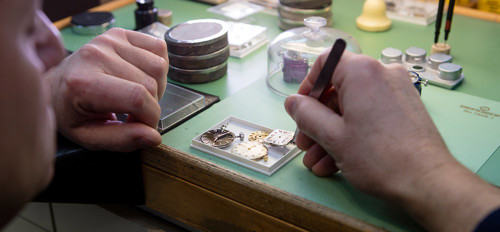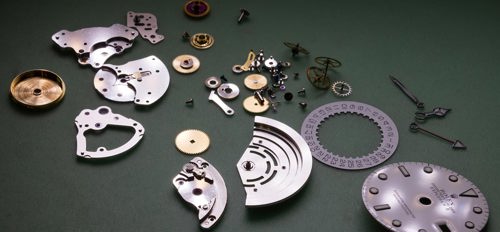At your service - how to keep your watch in mint condition
David Duggan Watches is one of the few locations in the UK with a fully approved Rolex servicing centre. Get advice on what to expect from a watch service from Service Manager, Tony Gedalovitch.
If you were lucky enough to receive a new or vintage watch at Christmas, or are considering purchasing one for yourself in 2020, you’ll need to know how to keep it in tip-top condition. The most important thing you can do is have it regularly serviced. After all, you wouldn’t expect your car, especially a classic model, to run smoothly without the appropriate checks and repairs. A watch might operate on a much smaller scale than an internal combustion engine, but it also has many highly complex workings that require just as much care and attention as that Jaguar E Type.
As well as servicing every watch that appears in our showroom window, we can overhaul almost any watch and are particularly proud to be one of the UK’s Rolex-accredited service centres – there are only a handful in the country.
To find out more about why it’s worth investing in a service and what our Rolex accreditation means, One To Watch talked to Tony Gedalovitch, who has been David Duggan’s servicing manager for 18 years.

![]()
Why have your watch serviced?
Vintage watches are an investment. In many cases, the longer they last, the more valuable they become, and servicing helps to extend their lifespan. Over time, the oils that lubricate a watch’s movement dry up, causing damage, which, in turn, affects the performance of the timepiece. “It’s important to have your watch serviced every three to five years to ensure it stays in good working order, though some older models may require more regular checks,” says Tony.
At David Duggan Watches, we pride ourselves on our state-of-the-art servicing centre. Our in-house facilities mean we can guarantee that every watch we sell has been fully refurbished before it goes in the window. “When customers buy a watch from us, they’ve got the confidence that it’s been serviced and is in excellent working order,” says Tony. “We put the watch back to mint factory condition. Plus, we provide continuity of care ̶ all watches bought at David Duggan can be brought back for ongoing servicing, maintaining that superior quality as when it was originally purchased.”
What does a service involve?
With more than 20 years’ experience in the field, our onsite technician, Ian, is a former expert watchmaker for Patek Philippe and Cartier, and Rolex-trained in servicing. It’s his job to carry out all our repair work, which he does painstakingly by hand.
A full service involves a series of checks. First, Ian removes the back of the watch and carries out an initial inspection of the movement. For instance, he establishes whether the oil is drying out, or if gaskets are starting to degrade. From there, the watch is taken apart and the component parts (the average watch has around 500) are run through our specialist Elmasolvex® multi-chamber cleaning machine, which uses a form of petrol with added ammonia to clean off any grease and oil. After rinsing and drying, the watch is reassembled, with new oil added to keep the mechanics running smoothly. At this stage, any worn parts, such as the rubber seals, are replaced. This requires great skill, as the parts can be extremely small; for example, some watch screws are no larger than a poppy seed.

![]()
Ian has a range of equipment that helps him to test a watch’s integrity. For instance, if you find your watch is running a little fast or slow, he can run it through a machine that replicates the movement of your wrist in six different positions. The combined data provides an average reading of your watch’s timekeeping ability and gives Ian the information he needs to decide how best to adjust the timepiece’s mechanics.
Once the service and repairs are complete, Ian valets the watch, cleaning and polishing all the parts, including the strap. Final checks include pressure-testing for waterproofness and a four-day test of the watch’s timekeeping. Considering the various complex stages, the service will usually take between six and eight weeks, depending on whether new parts need to be sourced.
Rolex-accredited servicing
While we can service any watch, we are proud to be an authorised Rolex servicing centre, qualifying us to carry out repairs and services on behalf of the Swiss brand. This means that Rolex supplies all parts for repairs directly to us and closely monitors our servicing process, carrying out an audit every two years to ensure that we always meet its high standards. “If Rolex makes any alterations to its care programme, such as a new filtration system,” says Tony, “Ian will attend a refresher course to keep up to speed with the way they do things.”
But, it’s not just in servicing Rolexes that Ian excels. He has a wealth of knowledge and experience in working with many other leading brands. For example, the training he gained during his years at Patek Philippe has equipped him to service and repair a watch to the company’s prized Seal Standard ̶ a rare skill, considering the many complications Patek Philippe models often include. So, whether it’s an old Omega chronograph, Jaeger-LeCoultre alarm, or Cartier Tank, Ian will expertly return your precious timepiece to full working order, sourcing any necessary parts from all over the world.
![]()
Bespoke service
One of the main benefits of having your watch maintained by David Duggan Watches, besides our high-quality craftsmanship, is our commitment to providing a truly bespoke service. For example, we’ve noticed a growing number of clients asking us not to re-polish their watch (a standard stage in the servicing process) to preserve the timepiece’s vintage appearance. “Lots of manufacturers can’t cater to individual requirements because they are servicing so many watches,” says Tony, “whereas we will always endeavour to do or, indeed, not do, exactly what the customer wants. We might think the Perspex hands on a Rolex could do with replacing, for example, but the customer may feel that will diminish the watch’s integrity, so we leave them be.”
Tips for caring for your watch between services
In between each service, it’s important to take diligent care of your watch. Here are our top tips:
Avoid baths and showers whilst wearing the watch. Prolonged exposure to hot water can degrade the seals and gaskets of a watch, even on a waterproof model.
Keep your watch away from magnetic sources, such as computer monitors, refrigerators, mobile phones or magnets on handbags, as this affects the parts inside the movement, and may cause failure to keep correct time.
Clean the watch regularly with a jewellery cloth to remove any surface dirt.
Store it in a box with a bag of desiccated silica to ensure a dry environment and protect the crystal from damage or scratching.
Avoid prolonged exposure to direct sunlight, which can fade the colour of your watch and shorten the battery life in a quartz model.
Avoid contact with chemicals, such as perfume or cologne, which can damage leather straps, weakening them and causing them to tear.
If you would like to find out more about David Duggan Watches servicing, contact us to make an appointment at our Burlington Arcade showroom.


